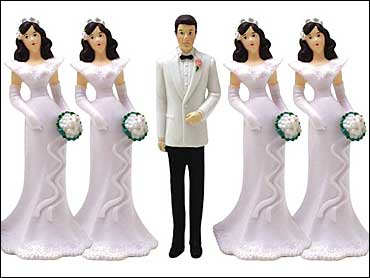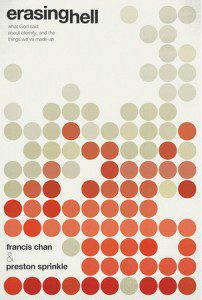
A couple of weeks ago, I received a lovely email from a woman who used to be LDS, and eventually left the Church over several issues, including the persistence of polygamous theology among Mormons. I’ve been meaning to answer some of her questions here on the blog. I’ve written a two-part post about polygamy in Mormonism – today’s portion being about the atavistic legacy of polygamy in Mormon belief structures, and next week’s being about how and why the Church has so often incorrectly downplayed the extent of actual polygamous practice in the 19th century.
Here is a portion of what this woman said:
How can I join a Church that teaches that I must “share” my husband with other women/goddesses in the afterlife? This is my BIG sticking point with the LDS faith. [My former] Bishop expressly stated to me that the Church DOES NOT and WILL NEVER promote polygamy, it was necessary in the 1800’s to “raise up a mighty generation,” blah, blah, blah. I guess he didn’t count on having a convert who is also an intelligent woman/trained researcher and debater. Of course, I read every text available on the LDS doctrine. When I discovered Apostle Bruce McConkie’s tome, it was the beginning of the end for me. Obviously, “The Plan” involves polygamy!
For the record, the LDS Church is now crystal-clear that polygamy is not to be practiced in this lifetime. Despite what you may have imagined from watching Sister Wives, anyone who does so is immediately excommunicated. However, this doesn’t mean that some Mormons don’t hold out hope that plural marriage will be the order of heaven, as many interpret D&C 132 to mean.
Polygamy in Practice
Unfortunately, polygamy is not only a lingering default belief for many Mormons but also a present temple reality. For example, living male widowers can be sealed in the temple to any deceased women that were married to them in life, no matter how many there were. Widowers can also be sealed to a new wife in the temple in addition to the wife or wives who died. Presumably when widower Apostle Russell Nelson remarried in 2006 in the temple, the new sealing was an addition to, and not a replacement of, his sealing to his deceased first wife. In contrast, church policy dictates that living women can only be sealed to one man.
And until fairly recently, men who obtained a civil divorce could remarry in the temple without also receiving a sealing cancellation, even though a sealing cancellation was required for women who wished to remarry. I understand that the Church has changed this policy and now requires any temple-married person who has been divorced to obtain a sealing cancellation before marrying a second time in the temple. (Though of course, all of the de facto heavenly polygamous relationships that were sanctioned by the previous policy are still intact.)
Polygamy in Principle
As for individual belief, I’ve occasionally heard it taught from the pulpit (and the Relief Society’s lace-draped table) that heaven will be polygamous. To be fair, in the RS lesson this declaration evoked criticism and debate of a kind not often seen in RS. But for many Mormons, particularly older ones, the belief in an afterlife of plural marriage is hardly a relic of the distant past.
To my email correspondent, and the many women (and some men) like her who have expressed private misgivings to me about plural marriage in heaven: I hope your souls can rest easy. Please don’t underestimate the power and love and mystery of a God who is going to work all this out in the afterlife—and the power and love and mystery of a heaven that is a fulfillment of God’s promise that there shall be no more tears. (Rev. 21) I’m positively baffled by the apparent self-loathing of Mormon women who can declare on the one hand that they hate polygamy with a passion but on the other hand confess that they have resigned themselves that God may well want them to live in polygamous marriage for eternity. What manner of skewed theology would posit a heaven requiring you to engage in something you find hateful?
I don’t believe in polygamy as an eternal principle. It is a historical fact from the LDS past, but not a divine mandate for my life. (Perhaps some readers have had spiritual confirmation that it is a divine mandate for theirs. Bully for them. I can only speak for myself.) I hope that this intelligent, thoughtful woman who is yearning for faith can see that it is possible to be a faithful Latter-day Saint for whom polygamy holds neither specter nor thrall.

